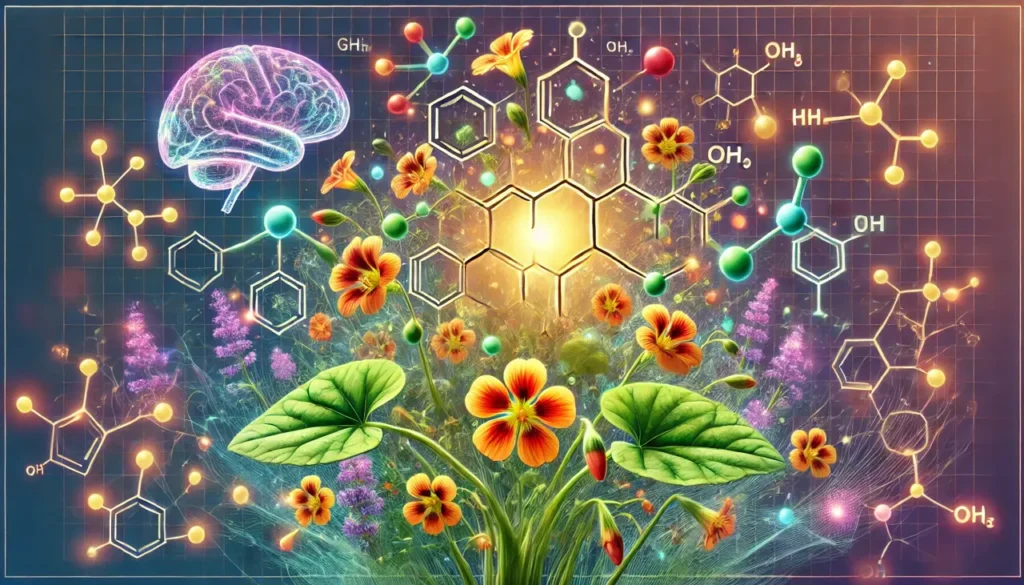Nasturtium (Tropaeolum majus) is a vibrant flowering plant that is native to South and Central America. Recognized for its bright, peppery taste and medicinal properties, nasturtium has been used for centuries in traditional medicine. While commonly known for its culinary uses in salads, soups, and garnishes, recent research has begun to explore the potential of nasturtium as a nootropic—a substance that may enhance cognitive function and brain health. This article examines the science behind nasturtium, its active compounds, its physiological mechanisms, the potential nootropic benefits it offers, safe dosing guidelines, side effects, possible interactions, and its therapeutic uses.
You May Also Like:
Sources of Nasturtium
Nasturtium is typically grown as an herb or ornamental plant in gardens, though it can also be found in the wild in temperate and subtropical climates. The leaves, flowers, and seeds of nasturtium are all used for various medicinal purposes, with the leaves and flowers commonly consumed fresh in food preparations or as extracts. It’s also available in the form of capsules, tinctures, and teas.
The plant contains a variety of active compounds, such as alkaloids, flavonoids, carotenoids, and essential oils. It is particularly noted for its high levels of vitamin C, which contribute to its antioxidant properties. The peppery flavor of nasturtium comes from compounds known as glucosinolates, which are sulfur-containing molecules that play a significant role in the plant’s defense mechanisms and may have therapeutic effects on the human body.
Unlock Optimal Brain Performance and Balance with Potassium Supplements—Shop Now on Amazon!

Chemistry of Nasturtium
The chemistry of nasturtium is complex, as it contains several bioactive compounds. Among the most prominent are:
- Glucosinolates: These sulfur-containing compounds are responsible for the characteristic peppery taste of nasturtium. Upon consumption, glucosinolates are broken down into biologically active metabolites, such as isothiocyanates, which are believed to have anti-inflammatory and antioxidant properties. Isothiocyanates may also support detoxification processes in the body, which could enhance overall brain function by reducing oxidative stress.
- Flavonoids: Nasturtium contains various flavonoids, including quercetin and kaempferol. These compounds act as antioxidants, neutralizing free radicals and preventing cellular damage. The neuroprotective properties of flavonoids have been widely studied, with evidence suggesting they may protect against neurodegeneration by reducing oxidative damage to neurons.
- Carotenoids: The carotenoids found in nasturtium—such as lutein and zeaxanthin—are important for protecting the retina of the eye and are also believed to play a role in improving cognitive function. Carotenoids, like other antioxidants, help reduce inflammation in the brain, supporting long-term neural health.
- Essential Oils: Nasturtium also contains essential oils, which include compounds like mustard oil, that are thought to possess antimicrobial and anti-inflammatory properties. These compounds may support cognitive function indirectly by promoting general well-being.
Physiological Mechanisms of Nasturtium in the Body and Brain
Nasturtium’s primary effects on the body and brain are linked to its antioxidant, anti-inflammatory, and neuroprotective properties.
- Antioxidant Activity: The flavonoids and carotenoids in nasturtium help protect brain cells from oxidative stress, which is a key factor in cognitive decline and neurodegenerative diseases such as Alzheimer’s and Parkinson’s disease. By neutralizing free radicals, these compounds help maintain the integrity of neural tissues and preserve cognitive function.
- Anti-Inflammatory Effects: Inflammation in the brain has been associated with cognitive decline, memory loss, and mood disorders. Nasturtium’s bioactive compounds, such as glucosinolates and flavonoids, have been shown to possess anti-inflammatory effects, which may reduce brain inflammation and protect neurons from damage.
- Support for Neurotransmitter Balance: Some of the compounds found in nasturtium may support the synthesis and regulation of neurotransmitters such as dopamine and serotonin. This can help improve mood and cognitive performance, contributing to better mental clarity and focus.
- Detoxification and Circulatory Support: Nasturtium is thought to support detoxification processes by stimulating liver function. This can be beneficial for brain health, as toxins and metabolic waste products are efficiently cleared from the body, reducing the load on the brain and promoting better cognitive function.
Relieve Stress and Improve Cognitive Performance with Magnesium Supplements—Buy Now on Amazon!

Nootropic Benefits of Nasturtium
The potential nootropic benefits of nasturtium stem from its combination of antioxidant, anti-inflammatory, and circulation-enhancing effects. Here are the key ways in which nasturtium may benefit cognitive function:
- Cognitive Enhancement: Nasturtium’s antioxidant properties protect neurons from oxidative damage, which can slow the aging process and improve cognitive function. By enhancing neuroprotective mechanisms, nasturtium may help maintain sharper cognitive abilities in aging individuals or those suffering from neurodegeneration.
- Mood and Mental Clarity: Due to its potential to regulate neurotransmitter function and reduce inflammation, nasturtium may support better mood and mental clarity. By maintaining a balanced emotional state, cognitive tasks such as concentration, decision-making, and memory retention can become easier.
- Memory and Learning: The antioxidants and anti-inflammatory compounds in nasturtium may play a role in improving memory and learning. Chronic oxidative stress and inflammation in the brain have been linked to impairments in learning and memory. By mitigating these processes, nasturtium may offer support for individuals seeking to improve memory performance.
- Protecting Against Neurodegenerative Diseases: Nasturtium’s neuroprotective effects may help reduce the risk of developing neurodegenerative diseases such as Alzheimer’s and Parkinson’s disease. Its antioxidant and anti-inflammatory actions may slow the progression of these diseases by reducing the damage caused by free radicals and inflammation.

Dosage and Supplementation Guidelines
While there is limited research on specific dosing guidelines for nasturtium as a nootropic supplement, general recommendations can be made based on traditional uses and the active compounds it contains.
- General Nootropic Dosage: As a supplement, nasturtium is typically available in the form of capsules, tinctures, or teas. For general cognitive support, a dosage of 500 mg to 1,000 mg of dried nasturtium extract per day may be appropriate. It is essential to start with a lower dose and gradually increase it to monitor for potential side effects.
- Nasturtium in Food: Consuming fresh nasturtium in food, such as in salads or as a garnish, can also offer some cognitive benefits. However, the concentration of active compounds in food may not be as high as in concentrated supplements. For general well-being, including nasturtium in a balanced diet can help maintain overall health.
- Standardized Extracts: For more consistent dosing, standardized extracts that contain specific amounts of active ingredients such as flavonoids and glucosinolates may be preferable. Following the manufacturer’s recommendations for extract dosages is advisable, as concentrations can vary.
Side Effects and Safety
Nasturtium is generally considered safe for most individuals when consumed in moderate amounts, either through food or supplementation. However, as with any supplement, there are potential side effects and safety considerations to be aware of:
- Allergic Reactions: Some individuals may be allergic to nasturtium, particularly to the plant’s compounds like mustard oil. Symptoms of an allergic reaction may include skin irritation, itching, or swelling. If any of these symptoms occur, discontinue use and seek medical attention.
- Gastrointestinal Upset: In some individuals, nasturtium may cause gastrointestinal discomfort, including nausea or diarrhea, especially when taken in large doses. To minimize the risk of digestive disturbances, start with a small dose and increase gradually.
- Pregnancy and Breastfeeding: There is insufficient evidence to confirm the safety of nasturtium supplementation during pregnancy and breastfeeding. As with any supplement, pregnant or breastfeeding women should consult their healthcare provider before using nasturtium.
Recharge Your Nights and Improve Sleep Quality with Trusted Sleep Supplements—Order Now on Amazon!
Interactions with Other Supplements and Medications
While nasturtium is generally considered safe, it may interact with certain medications or supplements. It is important to be cautious and consult a healthcare provider if you are on any of the following:
- Blood Thinners: Nasturtium may have mild blood-thinning effects due to its glucosinolate content. Individuals taking anticoagulant medications like warfarin or aspirin should use caution, as combining nasturtium with these drugs could increase the risk of bleeding.
- Antihypertensive Medications: Nasturtium has been shown to support circulatory health, which could have an additive effect when combined with antihypertensive medications. If you are on blood pressure medication, consult with your doctor to avoid potential interactions.
- Other Supplements: Nasturtium can be combined with other nootropic supplements, such as ginkgo biloba or Bacopa monnieri, to enhance cognitive performance, but care should be taken not to exceed recommended dosages.
Risks for Individuals with Certain Health Conditions
Nasturtium is relatively safe for most individuals, but there are certain health conditions in which caution may be necessary:
- Thyroid Disorders: Nasturtium, like other cruciferous vegetables, contains compounds that may interfere with thyroid function in individuals with thyroid disorders. Those with hypothyroidism or hyperthyroidism should consult with their healthcare provider before using nasturtium as a supplement.
- Blood Disorders: Because nasturtium may affect blood clotting, individuals with blood disorders, such as hemophilia, should avoid high doses of nasturtium.
Is Nasturtium a Viable Nootropic Supplement?
Nasturtium offers a wide range of potential health benefits, making it an exciting addition to the world of nootropics. Rich in antioxidants, flavonoids, and glucosinolates, this plant may help protect brain cells from oxidative damage, support cognitive function, and reduce the risk of neurodegenerative diseases such as Alzheimer’s and Parkinson’s. Its anti-inflammatory and circulatory-enhancing effects may further contribute to improved mental clarity, mood, and memory.
While research into its specific nootropic effects is still in the early stages, the evidence suggests that nasturtium’s active compounds can provide neuroprotective benefits, helping to preserve brain health as we age. Moreover, nasturtium’s ability to support detoxification processes in the liver may play a role in promoting overall brain function by removing toxins that could hinder cognitive performance.
It is important to remember, however, that, like any supplement, the safety and efficacy of nasturtium depend on proper use and individual health conditions. Careful attention should be paid to dosage, particularly for those with allergies, gastrointestinal sensitivities, or certain health conditions like thyroid disorders. By incorporating nasturtium into a comprehensive wellness plan, individuals may benefit from enhanced cognitive function, improved mood stability, and overall better mental and physical health. Always consult a healthcare provider before starting any new supplement, especially if you are already on other medications or have underlying health issues.

References:
- Nasturtium – Uses, Side Effects, and More. Retrieved from: https://www.webmd.com/vitamins/ai/ingredientmono-526/nasturtium
- A monocentric, randomized, double-blind, controlled crossover trial of nasturtium (Tropaeolum majus) on the lipid regulator prostaglandin E2. Retrieved from: https://www.frontiersin.org/journals/nutrition/articles/10.3389/fnut.2023.1223158/full
- Garden nasturtium (Tropaeolum majus L.) – a source of mineral elements and bioactive compounds. Retrieved from: https://pubmed.ncbi.nlm.nih.gov/29766690/
Important Note: The information contained in this article is for general informational purposes only, and should not be construed as health or medical advice, nor is it intended to diagnose, prevent, treat, or cure any disease or health condition. Before embarking on any diet, fitness regimen, or program of nutritional supplementation, it is advisable to consult your healthcare professional in order to determine its safety and probable efficacy in terms of your individual state of health.
Regarding Nutritional Supplements Or Other Non-Prescription Health Products: If any nutritional supplements or other non-prescription health products are mentioned in the foregoing article, any claims or statements made about them have not been evaluated by the U.S. Food and Drug Administration, and such nutritional supplements or other health products are not intended to diagnose, treat, cure, or prevent any disease.


